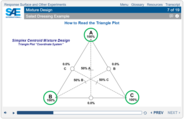Design of Experiments (DoE) for Engineers
How do you determine the root cause of a problem or identify which variable settings will make the product or process more "robust"? What if you need to gain a better understanding of a complicated system? Can you identify which variables most affect performance and obtain a well-correlated regression equation that explains how those selected system variables and their interactions affect performance?
Design of Experiments (DOE) is an excellent, statistically based tool used to address and solve these questions in the quickest, least expensive, and most efficient means possible. It's a methodology that includes steps for identifying system variables worthy of study and the ideal experiment type to execute; for setting up an organized, efficient series of tests involving various combinations of selected variables; and for statistically analyzing the collected data to help obtain definitive answers to these problem-solving and optimization challenges.
DOE is a methodology that includes steps for identifying system variables worthy of study and the ideal experiment type to execute; for setting up an organized, efficient series of tests involving various combinations of selected variables; and for statistically analyzing the collected data to help obtain definitive answers to these problem-solving and optimization challenges.
This eLearning course utilizes a blend of text, videos, and hands-on activities to help you gain proficiency in executing designed experiments. It explains the pre-work required prior to DOE execution, how to select the appropriate designed experiment to run, and choosing the appropriate factors and their levels. You'll also learn how to execute the experimental tests ("runs") and analyze/interpret the results with the benefit of computer software tools, such as Minitab.
You'll set up, run, and analyze simple-to-intermediate complexity Full Factorial, Partial Factorial, Taguchi/Robust, and Response Surface experiments both by hand and using computer software. You'll also receive an overview of Mixture experiments and information on how to install and configure a fully functional 30-day trial version of Minitab for completing practice activities and for personal evaluation. You'll gain the most value from this course by running experiments through various class exercises, with answers discussed after you've had the opportunity to execute the DOE on your own.
What Will You Learn
By participating in this on-demand course, you'll be able to:
- Determine when DOE is the correct tool to solve a given problem or issue
- Select the appropriate DOE experiment type (DOE goal) for a given application
- Set up simple Full Factorial DOEs by hand using cube plots
- Set up and analyze any Full Factorial DOE using Minitab®
- Identify appropriate Partial Factorial design(s) based on one's application
- Set up and analyze Partial Factorial DOEs, simple Robust Design (Taguchi) DOEs, and simple Response Surface DOEs using Minitab®
- Recognize the structured process steps recommended when executing a DOE project
Course Information
Is This Course For You
This course will benefit engineers involved in problem-solving, such as product design or product formulation (e.g., fluid/material composition, prepared food recipes/preparation, etc.) and/or optimization; process design and/or optimization; quality improvement efforts, such as defect elimination, warranty avoidance or similar initiatives; test engineers who wish to maximize learning of system behavior with a minimum number of tests; and technicians, analysts, and managers who support engineers in the above efforts, so they may be effective participants in DOE activities.
Materials Provided
- 90 days of online single-user access (from date of purchase) to the seven and a half hour presentation
- Integrated knowledge checks to reinforce key concepts
- Online learning assessment (submit to SAE)
- Glossary of key terms
- Job aids (included in each module of published course)
- Instructions on how to access a 30-day trial of Minitab®
- Video demonstrations of exercise solutions using Minitab®
- Follow-up to your content questions
- 1.0 CEUs*/Certificate of Achievement (upon completion of all course content and a score of 70% or higher on the learning assessment)
*SAE International is authorized by IACET to offer CEUs for this course.
Course Requirements
"There are no specific course prerequisites; however, participants are expected to have some math background, including the ability to calculate elementary statistics parameters, such as an average and a range. Since the course includes demonstration and hands-on use of Minitab®, participants should have some familiarity with Windows-based personal computer applications.
Topics
Recommended Content
| Online Course | Failure Mode and Effects Analysis (FMEA) for Robust Design Case Study |
| Online Course | Root Cause Problem Solving - Methods and Tools |
| Online Course | Tolerance Stack-up Fundamentals Web Course RePlay |
